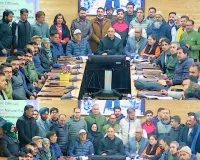INTERVIEW: Loss of Wetlands Makes Kashmir More Vulnerable To Climate-Related Disasters: Mehru Nissa
HT NEWS DESK
Srinagar, Feb 01: On the occasion of World Wetlands Day 2025, environmental scientist and educationist Mehru Nissa discusses with Associated News Bureau, the challenges that pose threat to the wetlands in Jammu and Kashmir.
Excerpts:
Q: Why are wetlands so vital, especially in a region like Jammu & Kashmir?
Mehru Nissa: Wetlands are the lifeblood of ecosystems. They regulate climate, maintain biodiversity, purify water, and help in flood mitigation. In J&K, wetlands like Hokersar and Wular provide crucial habitats for migratory birds while also supporting the livelihoods of communities dependent on fishing and agriculture. These wetlands play a significant role in maintaining groundwater levels and act as buffers during extreme weather conditions.
Q: What are the biggest threats facing wetlands today?
Mehru Nissa: The primary threats include rapid urbanization, pollution, and weak enforcement of conservation policies. Encroachments and unregulated land use have led to wetland shrinkage, while untreated waste disposal is polluting the remaining water bodies. Additionally, agricultural expansion, particularly rice cultivation, has contributed to wetland degradation, altering their ability to store carbon and regulate water levels. Climate change further exacerbates these issues by disrupting rainfall patterns and hydrological cycles.
Q: How has wetland loss affected the region, particularly in the context of climate change?
Mehru Nissa: The loss of wetlands has made the region more vulnerable to climate-related disasters. A prime example is the devastating 2014 floods in Kashmir, which were intensified by the loss of wetlands that once absorbed excess rainwater. Reduced wetland areas have also impacted groundwater recharge, leading to water scarcity. Additionally, the destruction of wetlands affects local fisheries, a crucial source of livelihood for many communities.
Q: Are current conservation efforts effective? What more needs to be done?
Mehru Nissa: While some measures have been taken—such as designating Ramsar Sites and launching conservation projects like the Wular Conservation Project—their impact is limited due to weak enforcement. There needs to be strict implementation of environmental laws, greater use of satellite monitoring to track encroachments, and more investment in scientific restoration projects. Public awareness and community engagement are also crucial to ensuring the protection of these ecosystems.
Q: How can individuals contribute to wetland conservation?
Mehru Nissa: People can play an essential role by reducing pollution, avoiding encroachment, and promoting sustainable agricultural practices. Supporting wetland-friendly tourism and participating in awareness campaigns can also help. Education is key—if people understand the significance of wetlands, they will be more inclined to protect them.
Q: What is your message on this World Wetlands Day?
Mehru Nissa: Wetlands are not just water bodies; they are life-support systems. Their loss will have devastating consequences for biodiversity, climate resilience, and human well-being. Conservation is not an option—it’s a necessity. We must act now to protect these ecosystems before it’s too late. (ANB)









Comment List